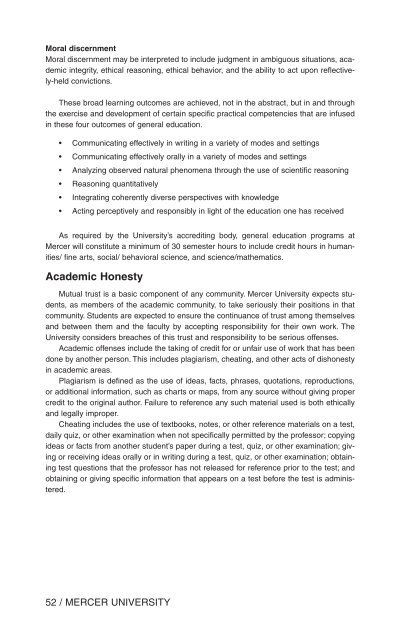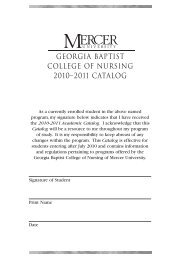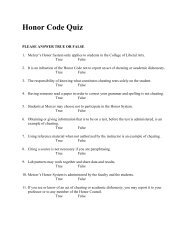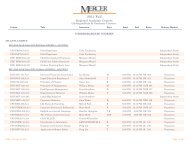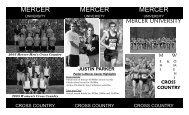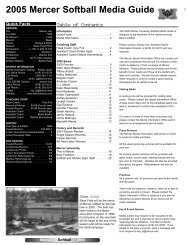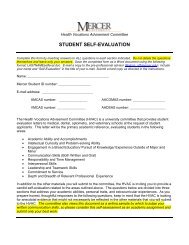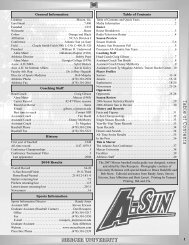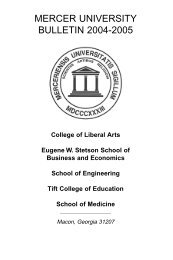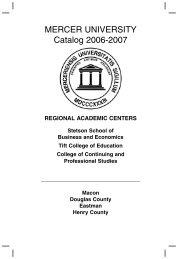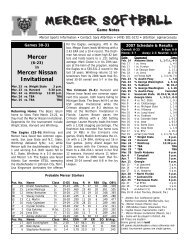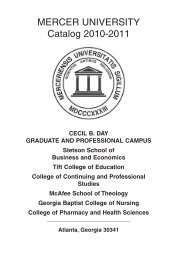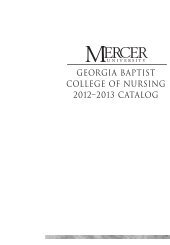- Page 5 and 6: Calendar 2011/2012Fall Semester 201
- Page 9 and 10: Human Resources(ACC Building) . . .
- Page 11 and 12: The UniversityFounded in 1833, Merc
- Page 13 and 14: of the Law School, returned to Merc
- Page 15 and 16: William Lowndes Pickard . . . . . .
- Page 19 and 20: nursing program and have successful
- Page 21 and 22: (703) 684-2782; Web site www.apta.o
- Page 23 and 24: GCO assists faculty in all aspects
- Page 25 and 26: ed conditionally into a Mercer prog
- Page 27 and 28: Campus LifeStudent Health Insurance
- Page 29 and 30: Wellness and Recreation classes can
- Page 31 and 32: 1. Have completed one-third of his/
- Page 33 and 34: Parking RegulationsFor the safety o
- Page 35 and 36: Financial Information2011-2012 Acad
- Page 37 and 38: Payment of Tuition and FeesAll tuit
- Page 39 and 40: completed form must be received in
- Page 41 and 42: Amount of Title IV fund to be retur
- Page 43 and 44: OverpaymentAll payments made by or
- Page 45 and 46: Total HoursMinimumEarnedCumulative
- Page 47 and 48: • A student may not receive Title
- Page 49 and 50: Disbursement and RefundsAll financi
- Page 51: Academic InformationGeneral regulat
- Page 55 and 56: Freshman . . . . . . . . . . . . .
- Page 57 and 58: RegistrationRegistration is require
- Page 59 and 60: Class Auditing RegulationsStudents
- Page 61 and 62: Independent StudyIn special cases,
- Page 63 and 64: Individuals who seek a second bache
- Page 65 and 66: A school official has a “legitima
- Page 67 and 68: The Eugene W. Stetson Schoolof Busi
- Page 69 and 70: Code of ConductHonesty and integrit
- Page 71 and 72: ations and subsequent registration
- Page 73 and 74: When a course is repeated, the stud
- Page 75 and 76: If a student’s previous record sh
- Page 77 and 78: School Honors at GraduationHonors m
- Page 79 and 80: 3. A minimum cumulative grade point
- Page 81 and 82: 1. English Composition I (3 hours)E
- Page 83 and 84: sophomore year. The faculty recomme
- Page 85 and 86: Course of Study for the Combined De
- Page 87 and 88: changes and error analysis, full di
- Page 89 and 90: BUS 350. Business Quantitative Anal
- Page 91 and 92: ECONOMICS (ECN)ECN 150. Principles
- Page 93 and 94: and bond analysis, securities marke
- Page 95 and 96: files of entrepreneurs, means of go
- Page 97 and 98: tation, and management of promotion
- Page 99 and 100: The College of Continuing andProfes
- Page 101 and 102: FreshmenGenerally, admission is off
- Page 103 and 104:
take the exam again, an additional
- Page 105 and 106:
Cultural awarenessCultural awarenes
- Page 107 and 108:
FDLS 130.FDLS 150.FDLS 170.Language
- Page 109 and 110:
gram is the emphasis on learning ex
- Page 111 and 112:
Public SafetyB.S.S.S. Degree128 Sem
- Page 113 and 114:
The Department offers a Bachelor of
- Page 115 and 116:
A. Health Information TechnologyINF
- Page 117 and 118:
Emphasis will be placed on the stud
- Page 119 and 120:
CRJS 375. Criminal Investigation(3
- Page 121 and 122:
course for credit more than once as
- Page 123 and 124:
INFORMATICS (INFM)INFM 110. Introdu
- Page 125 and 126:
INFM 331. Informatics, Expert Syste
- Page 127 and 128:
INSY 387. Social Services and Publi
- Page 129 and 130:
applications of linear, quadratic,
- Page 131 and 132:
ORGL 350. Values, Ethics, and Leade
- Page 133 and 134:
PUBLIC SAFETY (PSFT)PSFT 260. Conte
- Page 135 and 136:
ity and competency, risk assessment
- Page 137 and 138:
through design and execution of sci
- Page 139 and 140:
The Georgia Baptist College ofNursi
- Page 141 and 142:
Graduate StudiesMercer University i
- Page 143 and 144:
Tift College of Education500-599: P
- Page 145 and 146:
The Eugene W. Stetson Schoolof Busi
- Page 147 and 148:
4. Admission Standards:A. General S
- Page 149 and 150:
course taken at Mercer University m
- Page 151 and 152:
advisor may specify conditions with
- Page 153 and 154:
BBA/MBA Degree ProgramQualifying st
- Page 155 and 156:
BAA 510 is fulfilled by completing
- Page 157 and 158:
BAA 607. Management Information Sys
- Page 159 and 160:
This is a continuation of introduct
- Page 161 and 162:
environment of the health-care cons
- Page 163 and 164:
Attention is focused upon such topi
- Page 165 and 166:
BA 664. Electronic Commerce(3 hours
- Page 167 and 168:
Module 4:Corporate Strategy—Imple
- Page 169 and 170:
awareness on the differences in eco
- Page 171 and 172:
ACC 640ACC 641ACC 655Advanced Accou
- Page 173 and 174:
international financial reporting w
- Page 175 and 176:
The Tift College of EducationCarl R
- Page 177:
Grade Appeals PolicyStudents are en
- Page 180 and 181:
advocates for all learners. Each ar
- Page 182 and 183:
Attitude: To BeUpon completion of t
- Page 184 and 185:
Degree RequirementsNon-Restricted C
- Page 186 and 187:
• Understand how students differ
- Page 188 and 189:
Analogies Test (target score of 397
- Page 190 and 191:
ECE (K-5th) Endorsements in Mathema
- Page 192 and 193:
• Continuously evaluate and refle
- Page 194 and 195:
Attitude: To Be• Use effective co
- Page 196 and 197:
• Develop the ability to foster r
- Page 198 and 199:
Admission RequirementsAll persons w
- Page 200 and 201:
vide stronger evidence of the abili
- Page 202 and 203:
3. Models positive and effective in
- Page 204 and 205:
Leadership Track (either 4-year or
- Page 206 and 207:
7. Submit a current (less than 5 ye
- Page 208 and 209:
10. Participation in an interview w
- Page 210 and 211:
English to Speakers of Other Langua
- Page 212 and 213:
course will equip you with the know
- Page 214 and 215:
Candidates will gain an organized o
- Page 216 and 217:
in this course each semester until
- Page 218 and 219:
EDEL 616. Finance Management in 4-y
- Page 220 and 221:
facilitation techniques including d
- Page 222 and 223:
make visible the ethical challenges
- Page 224 and 225:
substitute for the advice and guida
- Page 226 and 227:
EDSC 631. Topics of Environmental S
- Page 228 and 229:
turally diverse and special needs p
- Page 230 and 231:
tent areas. The course objectives a
- Page 232 and 233:
12 setting. The course will include
- Page 234 and 235:
language development that provide t
- Page 236 and 237:
ety. Specifically, the course is de
- Page 238 and 239:
Master of Science in Public Safety
- Page 240 and 241:
Because of the nature of School Cou
- Page 242 and 243:
Dean for Graduate Programs will mak
- Page 244 and 245:
COUN 606. Psychological Helping Ski
- Page 246 and 247:
Students who do not successfully co
- Page 248 and 249:
2. Demonstrate an expertise in the
- Page 250 and 251:
hours and two semesters of Field Ex
- Page 252 and 253:
Master of Science in Clinical Menta
- Page 254 and 255:
The Graduate School Counseling Prog
- Page 256 and 257:
Limitation in Completion of Require
- Page 258 and 259:
Capstone ProjectDuring the candidat
- Page 260 and 261:
Required Research and Counseling Co
- Page 262 and 263:
sist of a minimum of 600 hours of e
- Page 264 and 265:
dents to lead others effectively an
- Page 266 and 267:
Degree Requirements (36 credit hour
- Page 268 and 269:
2. Students will become prepared fo
- Page 270 and 271:
Course Requirements: McAfee School
- Page 272 and 273:
Public safety leadership, to includ
- Page 274 and 275:
Transient StatusA student who is cu
- Page 276 and 277:
1. Masters Research Thesis option (
- Page 278 and 279:
have been part of a planned program
- Page 280 and 281:
• Examine the dynamics of motivat
- Page 282 and 283:
• Apply the competencies of leade
- Page 284 and 285:
COUN 608. Psychological Aspects of
- Page 286 and 287:
COUN 629. Program Promotion, Manage
- Page 288 and 289:
dominant, traditional models for pr
- Page 290 and 291:
connected with various theories and
- Page 292 and 293:
CRJS 625/725. Special Topics in Pub
- Page 294 and 295:
LEAD 700. Research Strategies for L
- Page 296 and 297:
PSLD 605. Leadership and Ethics in
- Page 298 and 299:
298 / MERCER UNIVERSITY
- Page 300 and 301:
300 / MERCER UNIVERSITY
- Page 302 and 303:
Based on Jesse Mercer’s vision, t
- Page 304 and 305:
Candidates for admission may be upc
- Page 306 and 307:
Upon action by the committee, the A
- Page 308 and 309:
Jesus & the Gospels and Paul & the
- Page 310 and 311:
or she must do so by that semester'
- Page 312 and 313:
The Student Advisory Council of the
- Page 314 and 315:
Completion of Degree RequirementsA
- Page 316 and 317:
Mentoring in the ChurchMIN 901 and
- Page 318 and 319:
Master of Arts in Christian Ministr
- Page 320 and 321:
Supervisory Professor to select a T
- Page 322 and 323:
Joint Degree in the Master of Divin
- Page 324 and 325:
• Students will demonstrate an un
- Page 326 and 327:
Biblical/Theological Foundations fo
- Page 328 and 329:
the student to correct any problems
- Page 330 and 331:
Contextual Ministry and Culture Tod
- Page 332 and 333:
Project Thesis Writing II. DMIN 756
- Page 334 and 335:
Ministry SkillsSeminar Preparation
- Page 336 and 337:
style expectations of the school. C
- Page 338 and 339:
CRE 684. Church Administration(3 ho
- Page 340 and 341:
alization issues that relate to mis
- Page 342 and 343:
MIN 901. Mentoring for Congregation
- Page 344 and 345:
NTG 814. Jesus in Contemporary Rese
- Page 346 and 347:
OTH 810. The Book of Psalms(3 hours
- Page 348 and 349:
This course addresses pastoral care
- Page 350 and 351:
PRC 854. Preaching and Christian Et
- Page 352 and 353:
etween the languages of science and
- Page 354 and 355:
Spring Reading Week—No Classes Ma
- Page 356 and 357:
W. Mansfield Jennings Jr., Hawkinsv
- Page 358 and 359:
C. Ray Tatum, B.A., M.A., Assistant
- Page 360 and 361:
University of Central Florida, 1987
- Page 362 and 363:
University, 1989; M.S., Ed.S., Ed.D
- Page 364 and 365:
Leonard E. Lancette (2000) Associat
- Page 366 and 367:
Fred W. Bongiovanni (1983) Professo
- Page 368 and 369:
University, 1973; M.A., Ph.D.,Unive
- Page 370 and 371:
370 / MERCER UNIVERSITY
- Page 372 and 373:
Natural Sciences (EDSC) . . . . . .
- Page 374 and 375:
Students . . . . . . . . . . . . .
- Page 376:
376 / MERCER UNIVERSITY


